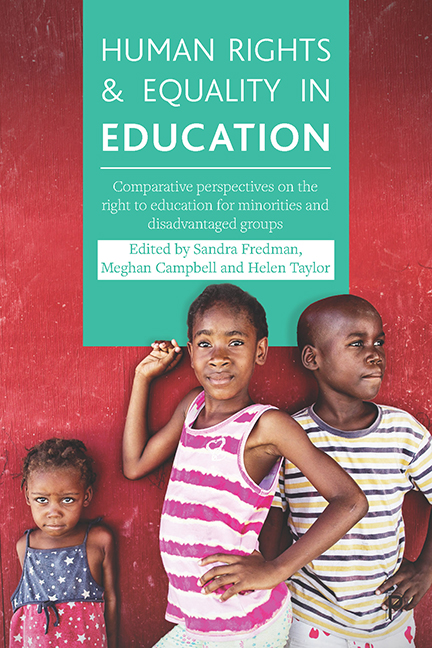 Human Rights and Equality in Education
Human Rights and Equality in Education Book contents
- Frontmatter
- Contents
- Notes on contributors
- Foreword
- Human rights and equality in education: Introduction
- Part I The role of public and private actors in education
- Part II Balancing the right to freedom of religion and culture and the right to education
- Part III Gender equality in education: moving beyond access to primary education
- Part IV Litigating for quality and equality in education
- Index
one - Public rights and private schools: state accountability for violations of rights in education
Published online by Cambridge University Press: 19 April 2022
- Frontmatter
- Contents
- Notes on contributors
- Foreword
- Human rights and equality in education: Introduction
- Part I The role of public and private actors in education
- Part II Balancing the right to freedom of religion and culture and the right to education
- Part III Gender equality in education: moving beyond access to primary education
- Part IV Litigating for quality and equality in education
- Index
Summary
Introduction
When we think of education and the human rights obligations of the state, we most often think of children having a right to education. This right is widely recognised in international law, as is the corresponding obligation on the state to vindicate it. Moreover, the right to education is the most commonly recognised right of children in national constitutions. Less attention tends to be paid to children's rights in education, such as the right to participate in decisions affecting them, the right to protection from harm, the right to dignified punishment and the right to religious freedom. While these rights are well recognised in international human rights law (most particularly the UN Convention on the Rights of the Child 1989 [CRC] and the European Convention on Human Rights 1950 [ECHR]), they are often not the subject of specific domestic law provisions setting out clear state responsibility for vindicating these rights in an educational setting.
Securing state accountability for vindicating the rights of children in education becomes particularly challenging in the context of private schools (whether fully private or some form of public–private partnership). In these schools, a private organisation is interposed between the rights-holder (the child) and the duty-bearer (the state). This poses the question of where responsibility lies if a child's rights are not vindicated. Can the state avoid being held accountable for a rights violation on the basis that a private actor is responsible for the act or omission involved – or does the state bear residual responsibility for ensuring that the rights of children in education are vindicated, regardless of the status of the school that they attend?
In essence, this was the question that confronted the European Court of Human Rights (ECtHR) in O’Keeffe v Ireland. While that case was focused on a violation of one specific right – namely, the right to freedom from inhuman and degrading treatment – its significance is much broader, and its central finding could, in principle, apply to any right held by children within the education system. The Grand Chamber's framing of the issue in terms of positive obligations and the taking of reasonable measures to prevent, detect and investigate rights violations provides a compelling framework for ensuring state accountability for rights violations in private schools.
- Type
- Chapter
- Information
- Human Rights and Equality in EducationComparative Perspectives on the Right to Education for Minorities and Disadvantaged Groups, pp. 11 - 24Publisher: Bristol University PressPrint publication year: 2018


